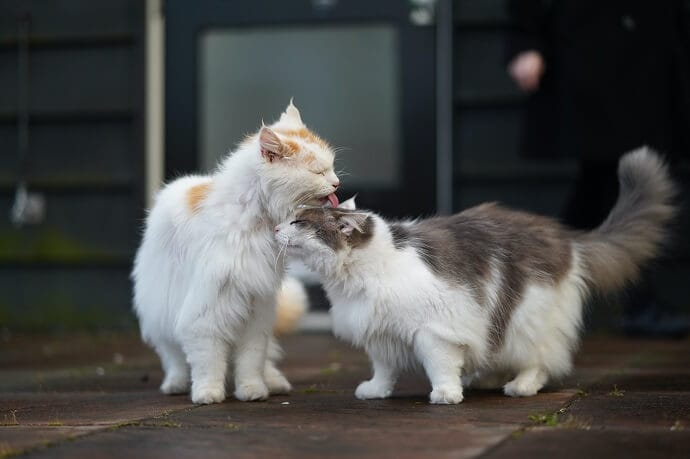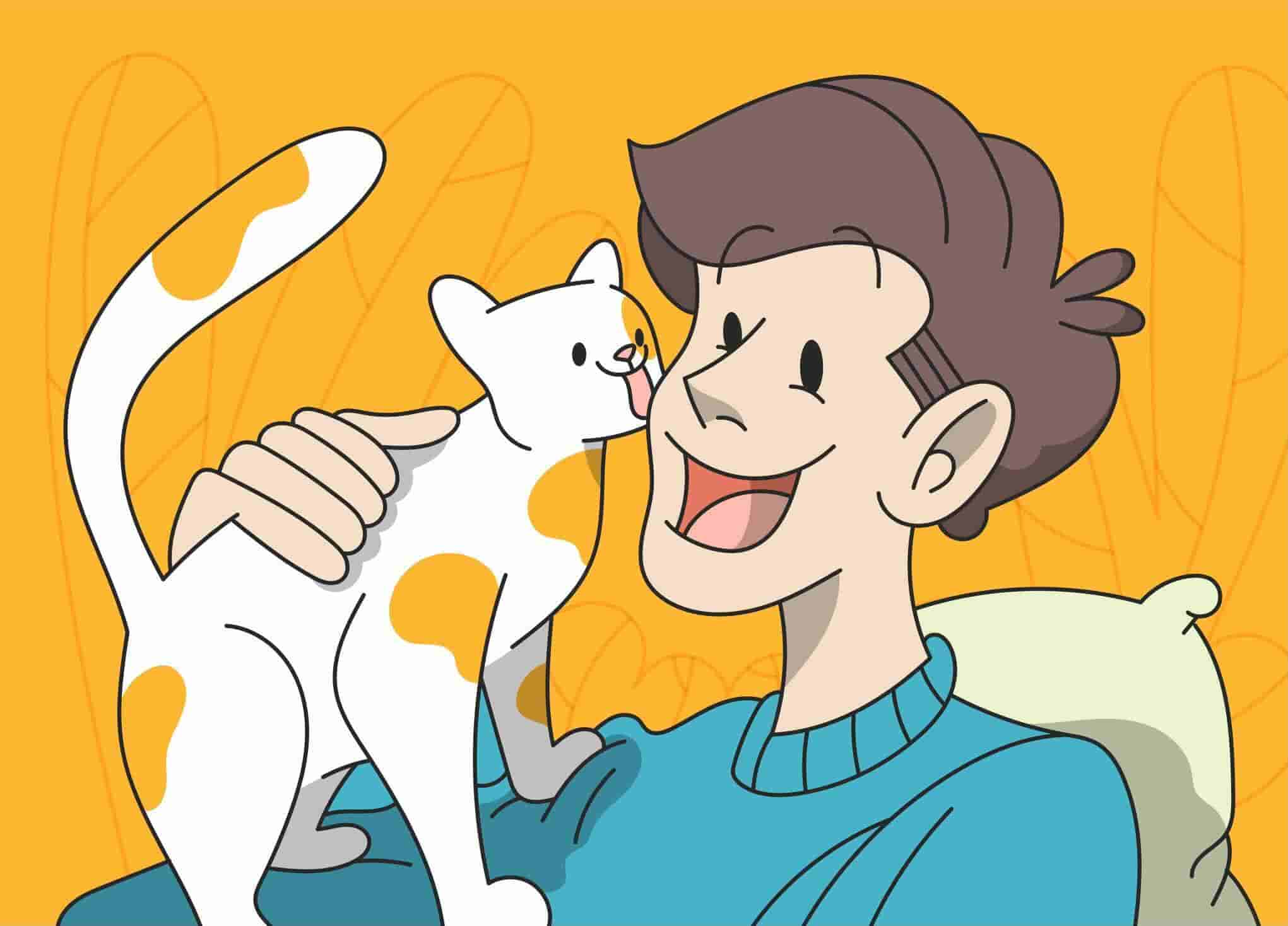If you’ve ever been licked by a cat, you’ll know what a curious sensation it is. A cat’s soft and fluffy exterior belies the abrasive shock of their sandpapery tongues. The claws, you expect. The tongue, not so much.
If you’re a cat paw-parent — or more correctly staff member (everyone knows cat have servants, not owners, right?) — you may have experienced your kitty using that rough little tongue a fair amount. On themselves, on you, on other cats, on the dog.
So, what’s the deal? What does it mean when a cat licks you?
Why does my cat lick me?
Let’s start off by saying that cats are very complex creatures so there’s no simple answer to why they do anything. There are usually a few reasons for their behavior — it’s just their way of being mysterious and keeping us humans on our toes.
The trick is to look at context cues to give you more information that might help identify what is causing the behavior.
Cats licking people is very common. While dogs commonly lick humans to show affection, can we assume it’s the same with cats? Let’s explore the possible reasons.
You taste good
Ok, this one’s a bit obvious. Why do cats lick you? Because you taste or smell good!
If there’s something tasty or interesting on your skin, your kitty will happily lick it off for you. It could be that you brushed up against something that left a residual smell, or it could even be the salty buildup on your skin from sweat.
Remember a cat’s sense of smell is far more sensitive than our own, so even if you can’t smell anything on your skin, chances are your cat’s nose will pick up something that its tongue wants to learn more about.
You are Family
Cats are known for being very particular about their hygiene and personal grooming, spending between 30 and 50 percent of their day, according to the article from the Cornell Feline Health Center, licking their fur to comb and clean it. Grooming also provides a measure of temperature regulation as well.
But what does it mean when your cat licks you? If your cat extends this grooming to you, then feel flattered. You’ve been granted social group status which in Cat World is a big deal.
Social grooming occurs often among cats that live together in a family or social group. One cat acts as the designated groomer to lick and groom the other cats. So, if your cat is licking you it’s because you’re considered part of the family.
It’s a grooming thing
Cats engage in social grooming as a way to help each other — by helping to clean hard-to-reach places, or to instruct each other how to clean properly. Momma cats will groom their kittens as a way of teaching them how to do it themselves.
All fine and well, but why is my cat licking me? If your cat is licking you, it might be because your cat thinks you need help grooming (you filthy, hooman) or because your cat kindly wants to teach you how to groom yourself properly.
They’re claiming you
Cats are highly territorial animals and will use pheromones, undetectable to humans, to warn other cats off their territory. Usually, this comes in the form of spraying and urinating on things or rubbing up against things to spread their scent.
Scent glands located behind their ears, on their back just above their tail, under their chin, and on their cheeks and paws produce a chemical scent. When they rub up against things, this scent remains as a kind of chemical message to other cats.
Similarly, licking also leaves a scent message and is your cat’s way of telling other cats that you’re taken. Translation: ‘lick lick’ in cat means, “you belong to me now”. You might notice that other cats keep a respectful distance from you once you’ve been claimed.
To get your attention
Are you familiar with the sensation of a sandpaper tongue licking your face or toes at 3 am? That’s a classic example of your cat demanding your attention (admittedly, at a very inconvenient hour).
Your cat may meow at you, or paw at you, and if neither of those is successful in getting you to pay attention, they will use their secret weapon — their rough tongue.
Kudos to them. It’s a very effective way of getting a human’s attention, second only to those razor-sharp claws. So, when kitty licks, stop whatever you’re doing and give her some cuddles, a treat, or whip out the toy mouse and have a play session.
If you ignore the tongue, the claws are next. You’ve been warned.
They’re stressed or anxious
Cats experiencing anxiety have been known to lick themselves and their humans excessively. Usually, it’s a response to a sudden and drastic change in their world, such as moving to a new house.
This is usually a temporary state and the licking will subside as your cat regains confidence in its environment. If the compulsive licking continues to the point that your cat has licked themselves raw or has created bald spots in their fur, then it’s time to visit the vet.
Why does my cat lick and bite me?
Ok, great. Now we know why your cat is licking you. But what does it mean if your cat gives you a few licks and then bites you? Is that different?
- Most commonly, cats will lick you and then bite you to get your attention. This usually occurs while you’re going about your business, not petting or playing with your cat at all. Suddenly your cat will begin to lick you and then deliver a sharp nip. That’s attention-seeking behavior or a love bite.
The bites in this instance are pretty painful but not aggressive at all, and your cat is otherwise relaxed and happy.
If your cat sticks around and looks at you expectantly, this is a clear signal that your cat wants to play.
- You’re familiar with the three strokes and you’re out rule, right? This is where you have a limited number of strokes and pets you can give your cat before you get bitten (sometimes preceded by licking).
It usually takes a lot more than three strokes. But the gist of the rule is that after a period of petting, your cat likely gets overstimulated and will lash out with some aggression.
If you’re petting your cat and they begin to lick and bite you, followed by them running away, this is your cue to leave them alone. They’ve had enough.
Why do cats lick each other?

Domestic cats living together under one roof usually form social groups. So, why do cats groom each other? Mostly, grooming is a sign of a social bond. Cats won’t simply groom any cat, only familiar members of their social group.
Mother cats and kittens from the same litter will groom each other as a sign of affection, and sometimes this loving gesture is continued into adulthood.
When cats groom themselves, they are usually not able to reach the top and back of their own head, and having a pal around to help out with those hard-to-reach places is helpful. Usually, the more dominant cat will do the grooming of the more submissive cat.
If a cat encounters another cat who seems ill or injured, they may groom them as a way to comfort them. The licking is usually focused on the injured or affected area, so if you have two cats and one is licking the other repeatedly in the same spot, perhaps a visit to the vet is a good idea.
Why do cats lick dogs?
If movies, cartoons, and popular culture are to be believed, dogs and cats hate each other. In these scenarios, the cat is usually the one picking on the sweet, innocent pooch.
While in reality this simply isn’t the case, it is still surprising to many pet owners to see their cat licking the dog.
So, why is your cat licking your dog?
This is a typical sign of pack behaviors. Both domestic dogs and cats usually live in social groups and will engage in social grooming as a way to show affection, acceptance, and care to those they consider family.
Basically, this is just your fur children accepting each other as pack mates. While this doesn’t mean they won’t occasionally fight with each other, it is a really good sign of a bond between them.
When to worry?
Licking in cats is generally nothing to worry about and is usually a very positive sign that your cat wants to bond with you or the other animals in the household.
If you notice that your cats licking is concentrated in one spot, is becoming obsessive and causing bald patches, or is accompanied by other context clues such as hiding, panting, vomiting, a change in appetite, or unprovoked aggression, it’s time to head to the vet to investigate further.
Was this article helpful?
Help us make our articles even better









